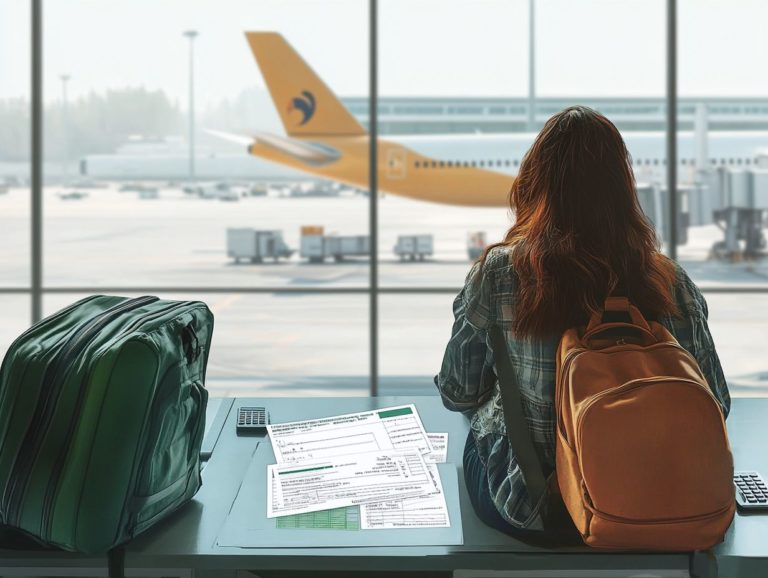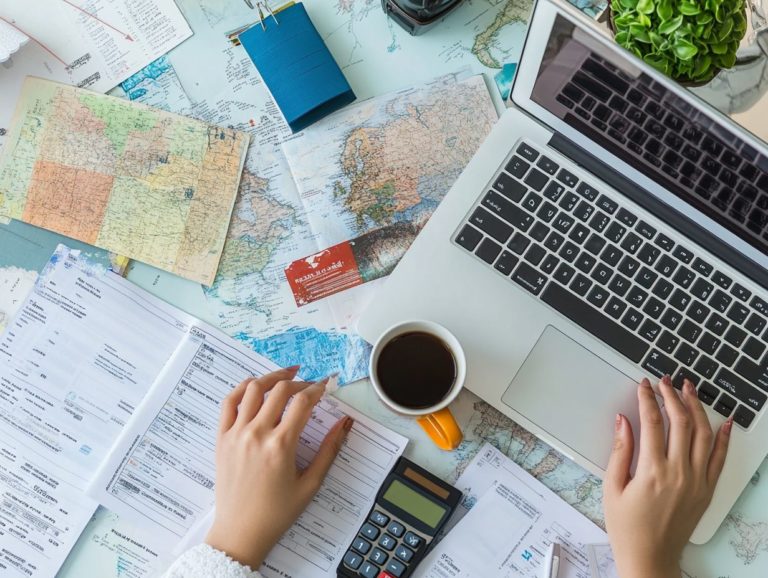What Are the Most Common Travel Scams?
Traveling should be an exhilarating adventure. However, it can also open the door to various scams that prey on tourists.
From schemes involving your money to misleading transportation and accommodation practices, the risks are real.
This article will help you learn to spot common travel scams before they catch you off guard! You’ll get strategies to avoid them and guidance on what to do if you face one.
Stay informed and travel smart your dream getaway deserves to be filled with joy, not overshadowed by regret.
Contents
- Key Takeaways:
- Types of Common Travel Scams
- How to Avoid Falling for Travel Scams
- What to Do if You Encounter a Travel Scam
- Frequently Asked Questions
- What Are the Most Common Travel Scams?
- How can I avoid becoming a victim of a fake taxi driver?
- What should I do if I suspect I’ve purchased a fake ticket or tour?
- How can I protect myself from pickpockets while traveling?
- What should I do if I become a victim of an ATM scam?
- How can I make sure I’m booking a legitimate hotel?
Key Takeaways:

- Always research and prepare before traveling to avoid falling victim to common money-related, transportation, and accommodation scams.
- Stay vigilant and aware while traveling, especially in high tourist areas, to avoid being targeted by scammers.
- If you encounter a travel scam, take steps to protect yourself and report the incident to the appropriate authorities.
Defining Travel Scams
Travel scams are tricks designed to target tourists. These scams can happen anywhere, from busy attractions to online websites. Understanding what constitutes a travel scam is essential for anyone looking to protect themselves while venturing into new destinations.
Con artists use charm to gain your trust. They might offer unsolicited help or pretend to be friendly locals. Common strategies include fake taxi services that charge exorbitant rates or unlicensed tour guides claiming to offer unforgettable experiences.
As a traveler, it s easy to overlook warning signs while getting swept up in the thrill of the adventure. Many online scams trick tourists into believing they are booking through legitimate sites, resulting in identity theft when someone steals your personal information to commit fraud and the compromise of sensitive data.
By recognizing these potential threats, you not only protect your personal details but also ensure a more enjoyable travel experience, free from the burdens of deceit.
Types of Common Travel Scams
Many scams target unsuspecting tourists. They include pickpocketing, ATM fraud, and con artists posing as helpful locals. Being aware of these various types is vital to protect your journey.
Recognizing these scams can significantly enhance your travel safety and elevate your overall experience.
Money-Related Scams
Money-related scams are among the most harmful forms of fraud. They often involve excessive charges that catch travelers off guard. Techniques like credit card skimming, counterfeit bills, and fake charity petitions trick you into losing your hard-earned money, necessitating vigilance and awareness to steer clear of these pitfalls.
Take credit card skimming, for instance. This sneaky tactic usually happens at ATMs or retail outlets where hidden devices capture your card information, leaving you vulnerable to identity theft. Counterfeit bills can be tricky to spot in bustling marketplaces, where you might inadvertently receive or hand over fake currency during transactions.
Fake charity petitions exploit your compassion, presenting heart-wrenching tales to solicit donations without any genuine cause. To avoid falling prey to such scams, consider using cash for smaller purchases to ensure you re dealing with authentic currency. Always inspect credit card slips before signing, and exercise caution when sharing personal information that could lead to fraud.
Transportation Scams

Transportation scams frequently target tourists, presenting themselves in various deceptive forms that can lead to unexpected expenses and significant inconvenience. From cab drivers who manipulate fares to motorbike scams, where unsuspecting travelers are overcharged for simple rides, these scams can mar your travel experience, leaving you feeling vulnerable and taken advantage of.
Understanding these pitfalls is essential for ensuring that your transportation remains safe and cost-effective.
In bustling cities, for example, you may encounter scammers who approach you with seemingly attractive ride offers, only to demand exorbitant fees once you reach your destination. Some taxi drivers might play tricks with their meters or take unnecessarily long routes to inflate the fare. If you hop on a motorbike taxi without confirming the price upfront, you could be in for an unpleasant surprise at the journey’s end.
To navigate these challenges effectively, it s wise to utilize reputable ride-hailing apps, agree on fares beforehand, and always stay alert to the routes being taken. Keeping cash in small denominations helps protect you from overcharging threats.
Accommodation Scams
Accommodation scams can greatly impact your travel experience, leading you to misleading listings and excessive charges for subpar lodgings. Naive tourists often find themselves vulnerable to fraudulent rental companies, with scams ranging from fake holiday home rentals to vacation properties that simply don’t exist. This can result in financial loss and stress for unsuspecting guests.
To navigate the accommodation landscape safely, awareness and careful research are paramount. Scammers know how to create tempting listings that can fool anyone. Consider the example of a group of friends who thought they had booked the perfect beach house, only to arrive and discover a vacant lot instead.
To shield yourself from such predicaments, it s wise to verify the legitimacy of any rental you re considering. Here are some effective strategies:
- Check reviews from multiple sources.
- Utilize reputable booking platforms.
- Conduct reverse image searches to confirm the property s existence.
A simple phone call to the property manager can also shed light on its credibility, helping ensure a safe and enjoyable travel experience.
How to Avoid Falling for Travel Scams
Avoiding travel scams demands a proactive mindset and a sharp awareness of potential traps that can ensnare unsuspecting tourists in various deceptive schemes. Equip yourself with travel safety tips. Stay alert to suspicious behavior to reduce your risk of falling victim to scams.
This preparation can make your travels safer and a lot more fun! It s crucial to know the risks of using public Wi-Fi and other common situations.
Researching and Preparing
Effective research and preparation are your best allies in avoiding scams while traveling, equipping you with the knowledge and resources needed to navigate your journey safely.
By familiarizing yourself with specific travel safety strategies, you can significantly reduce your risk of falling victim to fraud. Thoroughly investigating rental listings is crucial; using trusted platforms and reading reviews will help you distinguish between legitimate accommodations and potential scams. Similarly, recognizing authentic local services, such as verified tour operators or well-regarded restaurants, will provide you with added reassurance.
Stay vigilant when connecting to public computers or non-official Wi-Fi networks, as these can expose your personal information to third parties. By implementing these research techniques and preparation methods, you create a secure travel environment, allowing you to immerse yourself fully in your adventures without the constant worry of scams.
Being Vigilant and Aware

Stay alert and protect yourself from scams while traveling. Your adventure should be exciting and safe! Being vigilant and aware of your surroundings is essential for avoiding scams while traveling. Many deceptive practices thrive on unsuspecting tourists who are distracted or caught off guard.
By keeping an eye out for suspicious locals and engaging with overly chatty cashiers, you can better identify potential scams. Recognizing staged distractions enables you to stay alert and defend against fraud attempts. This heightened awareness not only enhances your personal safety but also enriches your overall travel experience.
Establishing a habit of scanning your environment allows you to spot anything that feels off, whether it s an unusually aggressive street vendor or a crowd that forms out of nowhere.
Using technology, like travel apps or local news updates, provides valuable insights into prevalent scams in different regions, equipping you with knowledge specific to your destination.
Surrounding yourself with trustworthy companions and sharing your experiences can create a sense of security while promoting effective communication about any warning signs you encounter.
Ultimately, adopting an attitude of caution and curiosity transforms your exploration of new locales into a more rewarding and safer adventure.
What to Do if You Encounter a Travel Scam
Encountering a travel scam can be a deeply unsettling experience, but understanding the steps to take can significantly mitigate the situation and shield you from further harm. It s crucial for you to act swiftly to protect your personal information and finances, particularly in instances of identity theft.
It’s important to report scams to local authorities or tourism boards; this not only safeguards your interests but also helps prevent others from becoming victims. By taking these proactive measures, you can enable yourself in the face of adversity and navigate the challenges of travel with confidence.
Steps to Take to Protect Yourself
Protect yourself from travel scams by using smart money management. This includes using a secure mobile payment app and meticulously counting your change during transactions.
Ensuring accuracy in cash payments and being vigilant about excessive charges can go a long way in safeguarding your funds while you re on the move. By adopting these strategies, you can significantly reduce your risk of financial loss and enhance your overall safety during your travels.
Always keep an eye on your bank statements for unauthorized charges. Familiarizing yourself with local currencies and utilizing services that provide real-time exchange rates can be incredibly beneficial.
When making purchases, consider opting for credit cards that offer fraud protection for that extra layer of security. Setting transaction limits on your debit and credit cards is another proactive measure worth taking.
Always avoid sharing personal financial information in informal settings, ensuring that your payment methods remain confidential and secure.
Remember, being aware can turn a potential scam into a minor bump on your journey.
Reporting the Scam
Reporting scams to the right authorities is vital. It not only provides a sense of justice but also safeguards the entire community.
By reporting scams, you help protect unsuspecting tourists from being targeted by fake police or dubious beggars.
Engaging with tourism boards and local law enforcement can provide you with valuable support in tackling fraudulent activities. Sharing your experiences raises awareness about prevalent scams, like fake petitions in certain areas. Together, we can create a safer travel experience for everyone!
When you encounter a scam, make sure to write down the details carefully. Note what happened, where it took place, and if possible, capture images or videos of the situation. This information will prove invaluable when reporting to authorities or organizations like the Local Tourist Office.
Use social media to spread the word and keep others informed about potential threats.
By participating in discussions, you not only empower yourself but also contribute to a network of shared knowledge that can shield fellow travelers from falling victim to deceitful tactics. Ultimately, this proactive approach is a significant step toward safeguarding the entire travel community.
Frequently Asked Questions

What Are the Most Common Travel Scams?
The most common travel scams include fake taxi drivers, fake tickets and tours, pickpocketing, ATM scams, and fake hotels.
How can I avoid becoming a victim of a fake taxi driver?
To avoid falling for a fake taxi driver scam, make sure to only use official taxis with clearly marked logos and numbers. Also, agree on a fare before getting into the taxi and pay with small bills to avoid being overcharged.
What should I do if I suspect I’ve purchased a fake ticket or tour?
If you suspect you’ve been sold a fake ticket or tour, immediately contact the company or organization where you purchased it from. You may also consider reporting the scam to the local authorities.
How can I protect myself from pickpockets while traveling?
To protect yourself from pickpockets, keep your personal belongings close to you at all times. Avoid keeping valuables in your back pocket and be aware of your surroundings in crowded areas.
What should I do if I become a victim of an ATM scam?
If you become a victim of an ATM scam, immediately contact your bank and cancel your card. You may also consider reporting the incident to the local authorities and keeping a record of the fraudulent transaction.
How can I make sure I’m booking a legitimate hotel?
To ensure you’re booking a legitimate hotel, do thorough research before making a reservation. Look for reviews from previous guests, check the hotel’s official website, and use reputable booking platforms.
Have you encountered a scam while traveling? Share your story in the comments below!






